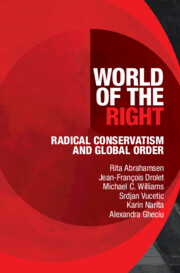5 - The Right World
Published online by Cambridge University Press: 13 June 2024
Summary
The chapter examines how the radical Right’s counter-hegemonic struggle relates to other struggles for power in contemporary world politics and attacks on the so-called liberal international order (LIO). Drawing on recent literature on struggles for recognition, we show how the radical Right has built powerful transversal, global alliances based on a logic and discourse of difference and diversity rather than claims to Western superiority. We illustrate this through an analysis of an emerging global alliance in defence of the ‘natural family’. The radical Right’s civilisationalism and calls for multipolarity also enable complex, strategic convergences with illiberal states such as China and Russia, as well as states and people in the Global South. The multi-polar, civilisational world order envisioned by the radical Right is not anti-hierarchical and inclusive, but legitimises new differences and new forms of exclusion through its claims to cultural diversity. It is a more sovereigntist vision of the world in which exclusionary illiberal forces would be able to operate with fewer international constraints.
Keywords
- Type
- Chapter
- Information
- World of the RightRadical Conservatism and Global Order, pp. 144 - 182Publisher: Cambridge University PressPrint publication year: 2024

